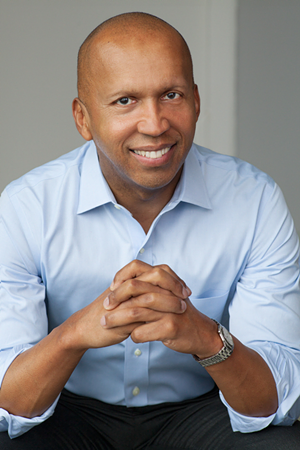There was a large, sold-out crowd on hand for Bryan Stevenson’s talk at Downtown’s Aronoff Center for the Arts on Wednesday night — the first of what will be an annual Mary S. Stern Lecture presented by the Public Library of Cincinnati and Hamilton County.
What people heard from the impassioned, eloquent and charismatic author, public-interest lawyer and MacArthur Foundation fellow is likely to stay with them, especially as he urged them to be engaged in reforming the U.S. justice and incarceration system, end the death penalty (especially in Ohio) and become active to erase the pernicious effects of racism toward African-Americans on America’s past and present.
“I don’t think slavery ended in 1865; I think it evolved,” he said at one point. He also suggested that something similar to South Africa’s post-apartheid Truth and Reconciliation Commission might help rectify the system; just by mentioning it, though, he worried that it makes nervous those who have comfortably benefited from the long-segregated society.
“I don’t want to punish anybody. I want to liberate America,” he said. “I feel our country needs an era of truth and justice. I do believe we can get to a better place, but we have to change the narrative.”
Stevenson is the founder of the nonprofit Equal Justice Initiative in Montgomery, Ala., which is dedicated to addressing the issues of racial justice, children in prison, mass incarceration and the death penalty. It also created Montgomery’s new Legacy Museum and National Memorial for Peace and Justice, which explores the history and effects of America’s racial injustice. The New York Times has described the memorial, which in particular addresses the long history of lynching, especially in the South, as being dedicated to the victims of white supremacy.
As a public interest lawyer, Stevenson has dedicated his career to helping the poor, the incarcerated and the condemned. His 2014 memoir Just Mercy: A Story of Justice and Redemption, has been a bestseller.
At the Aronoff, he gave shocking statistics about America’s incarceration numbers as well as the rate of incarceration for African-Americans. Currently, he said, there are 2.2 million people in custody in the U.S. He blamed much of this on the “misguided” war on drugs that began in the 1980s, and for the “politics of fear and anger” that prevents the country from acknowledging the harm this so-called war has caused.
He also decried the insensitivity of the court system to correcting a wrong conviction or sentence once the process has started. To illustrate, he told the story of representing a man on death row who, it became clear to him, had an intellectual disability that should have prevented his execution. But in his attempt to get the sentence changed, he discovered the courts kept upholding it because the case had been settled.
“Courts seem to be more concerned with finality than fairness,” he said. Then, he added, “Why do we want to kill all the broken people?”
He appealed to his audience to see themselves as part of a greater “broken community” — a country divided by the racial disparities, including poverty, that have gone unaddressed. And he asked for outreach, understanding and activism to address the inherent societal unfairness. “The opposite of poverty is justice,” he said.
The lecture ended with a call to visit the Equal Justice Initiative’s website, at eji.org, for ideas about getting involved. He was met with long applause and a standing ovation.


